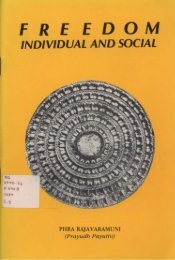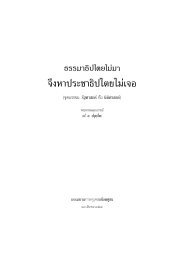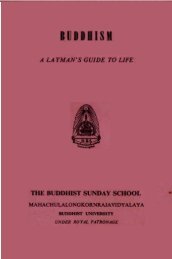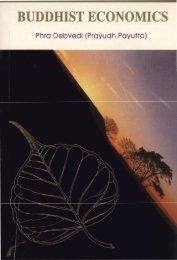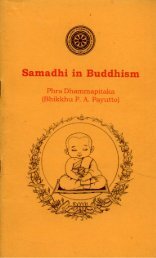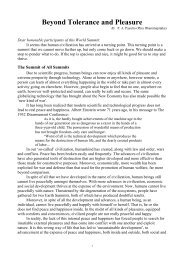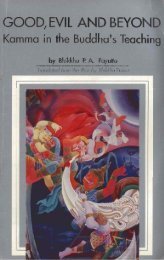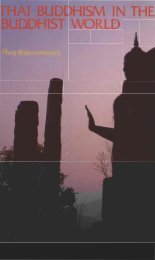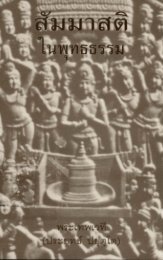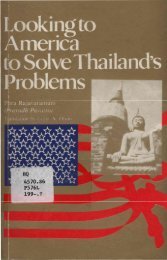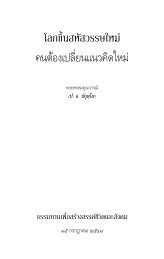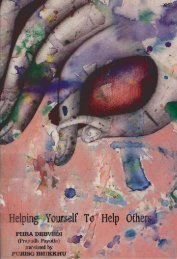The Great Buddha
You also want an ePaper? Increase the reach of your titles
YUMPU automatically turns print PDFs into web optimized ePapers that Google loves.
<strong>The</strong> <strong>Great</strong> <strong>Buddha</strong><br />
Dear Venerables and Dharma Friends:<br />
I believe that all of you seated here today are<br />
students of the <strong>Buddha</strong>. As sons and daughters, we<br />
must know our parents. As students of the <strong>Buddha</strong>,<br />
how can we not know about the <strong>Buddha</strong>? Perhaps<br />
some of you in the audience may say, “How can I not<br />
know the <strong>Buddha</strong>? Just look at the statues of the<br />
<strong>Buddha</strong> here.” Do we know the <strong>Buddha</strong> just because<br />
we see these statues? No, we certainly cannot. It is<br />
most regretful if we, as students of the <strong>Buddha</strong>, do not<br />
know about the <strong>Buddha</strong>. <strong>The</strong>re is a verse that aptly<br />
describes a common feeling among students of the<br />
<strong>Buddha</strong> in this Period of Declining Dharma. It states,<br />
- 1 -
“When the <strong>Buddha</strong> came to this world, I was mired in<br />
depravity. Now that the <strong>Buddha</strong> has gone into<br />
parinirvana, I have come into this world. I regret that<br />
because of my many karmic hindrances, I have not<br />
been able to see the golden body of the <strong>Buddha</strong>.”<br />
Over the last fifty years, I have learned a lot<br />
about the <strong>Buddha</strong>. I did a lot of research when I authored<br />
the book <strong>The</strong> Life of Sakyamuni <strong>Buddha</strong>, so<br />
one can say I have a little more knowledge about the<br />
<strong>Buddha</strong>. Today, I want to share with you what I know<br />
about the <strong>Buddha</strong>, and to introduce to all of you the<br />
real essence of the <strong>Buddha</strong>.<br />
Some of you may think that the <strong>Buddha</strong> is an<br />
almighty immortal with all kinds of powers, who can<br />
come and go without a trace. If you think this is the<br />
<strong>Buddha</strong> I am going to share with you, you will be<br />
disappointed. You may think that the <strong>Buddha</strong> is full<br />
of loving-kindness, and will grant you whatever you<br />
ask for in your prayers. This is not the case, either. I<br />
believe most people prefer the <strong>Buddha</strong> that sits<br />
cross-legged on the altar–serene, peaceful, quiet, and<br />
still. If the <strong>Buddha</strong> spoke and instructed us now,<br />
“Don’t do this,” or “That’s not the case,” we might<br />
not like the <strong>Buddha</strong> as much. Perhaps because the<br />
- 2 -
<strong>Buddha</strong> is not critical of us, does not reproach us or<br />
argue with us, we are drawn to him. We willingly pay<br />
respect and prostrate to him.<br />
Now, I will try to describe the <strong>Buddha</strong> through<br />
the following ten questions. Hopefully, we can learn<br />
the real essence of the <strong>Buddha</strong> through these questions.<br />
I. Has the <strong>Buddha</strong> ever been angry?<br />
We often get mad; was this also true of the<br />
<strong>Buddha</strong>? Of course, the <strong>Buddha</strong> did! It is just that [the<br />
reasoning for] the <strong>Buddha</strong>’s anger is different from<br />
ours.<br />
We are incensed when others pick on us or get in<br />
our way. When our interests are compromised, we get<br />
irritated. This was not the case with the <strong>Buddha</strong>. <strong>The</strong><br />
<strong>Buddha</strong> would not have minded if you were not nice<br />
to him; however, the <strong>Buddha</strong> became angry if you<br />
mistreated others. Let me illustrate this point with the<br />
following episode from a sutra.<br />
Once, the <strong>Buddha</strong> was traveling with his group<br />
of bhiksus to preach the Dharma. Among these bhiksus,<br />
some were impatient and quick-tempered, while<br />
others had a calmer disposition. While on their way,<br />
- 3 -
way, they stopped at a temple to rest for the night. As<br />
soon as they settled down, the impatient bhiksus<br />
quickly claimed the available beds: “This one’s<br />
mine!” “That one’s mine!” In this fashion, all the<br />
available beds were taken in no time, and Sariputra,<br />
the <strong>Buddha</strong>’s chief disciple was left without a bed. As<br />
a result, he decided to practice walking meditation<br />
outdoors. When the <strong>Buddha</strong> saw Sariputra strolling<br />
outside, the <strong>Buddha</strong> went up to him and asked,<br />
“Sariputra, it’s quite late now. Why aren’t you in bed<br />
and still wandering about in the yard?” Sariputra then<br />
recounted to the <strong>Buddha</strong> all that had happened: “We<br />
have a lot of bhiksus and there aren’t enough beds to<br />
go around. Some of the new bhiksus wanted to find a<br />
bed to retire for the night, so I let them rest first.”<br />
When the <strong>Buddha</strong> heard this, he was really angry. He<br />
immediately called everyone to a meeting where he<br />
preached about the respect one should have for one’s<br />
elders.<br />
When we do not respect our elders, the relationship<br />
between the elderly and the young is turned<br />
upside down, and society becomes disorderly. In the<br />
past, parents would guide and remind their children,<br />
“Why won’t you listen to your Mom and Dad?”<br />
- 4 -
Nowadays, children complain to their parents, “Mom<br />
and Dad, why you don’t listen to me?” Even very<br />
young children know how to bargain for what they<br />
want, “If you don’t buy this for me, I won’t study hard<br />
for your sake!” In the past, students would humbly<br />
accept what their teachers taught them. Now, it is<br />
fashionable for students to criticize their teachers,<br />
“Teacher so-and-so isn’t very nice. Every time I make<br />
a suggestion, he or she always turns me down.” In the<br />
past, employers gave instructions to employees on<br />
what to do. <strong>The</strong>se days, employees make demands of<br />
their employers, “<strong>The</strong> food in the company cafeteria<br />
needs to improve,” or “You need to give me a raise of<br />
this much so I can make due.” In the military of the<br />
past, officers gave commands that their subordinates<br />
would have follow. Now, subordinates can openly<br />
criticize the officers. When there is no standard for<br />
our behavior, the fabric of society is weakened and<br />
social morality cannot be maintained. It is no wonder<br />
that disorderliness rules.<br />
<strong>The</strong> <strong>Buddha</strong> would get angry with those who<br />
were only concerned about their own welfare and had<br />
no regard for others’ hardships. <strong>The</strong> <strong>Buddha</strong> would<br />
also become displeased when a prank, even that of a<br />
- 5 -
youngster, ended up hurting others. Let me illustrate<br />
with the following example. Before the <strong>Buddha</strong> renounced<br />
his life of a prince, he had a son by the name<br />
of Rahula. When Rahula was still a young child, he<br />
followed in his father’s footsteps and renounced his<br />
household life to become a monk. Because he was<br />
still young, he was very mischievous and liked to tell<br />
little white lies. Once, someone asked Rahula, “Do<br />
you know where the <strong>Buddha</strong> is right now?” Although<br />
he knew that the <strong>Buddha</strong> was in the room to his left,<br />
he purposely pointed to the right and said, “<strong>The</strong><br />
<strong>Buddha</strong> is over there.” When the person came back<br />
empty-handed, Rahula was very pleased with himself.<br />
Later, the <strong>Buddha</strong> learned of this incident and called<br />
on Rahula to come before him. When Rahula saw the<br />
<strong>Buddha</strong>’s stern expression, he did not dare say a word.<br />
Quietly, he went to fetch a basin of water for the<br />
<strong>Buddha</strong> to wash his feet in, so that the <strong>Buddha</strong> would<br />
soon start to preach. After the <strong>Buddha</strong> washed his feet,<br />
he told Rahula, “Take this basin of water and drink<br />
it!” Rahula was shocked at what he had just heard,<br />
and replied, “Honorable <strong>Buddha</strong>, the water used for<br />
washing feet is very filthy and isn’t suitable for<br />
drinking!”<br />
- 6 -
<strong>The</strong> <strong>Buddha</strong> instructed, “When you tell lies, your<br />
mouth is as filthy as the dirty water in this basin.<br />
Nobody would want you, either!”<br />
Rahula then went to discard the water. Afterwards,<br />
the <strong>Buddha</strong> told him, “Use this basin to hold<br />
your food!”<br />
Rahula appeared very troubled and said, “Honorable<br />
<strong>Buddha</strong>, this basin used for washing feet is<br />
very dirty; I can’t put my food in it!”<br />
<strong>The</strong> <strong>Buddha</strong> reproached him, “When your mouth<br />
tell lies often, it’s just as filthy as this basin. It can’t be<br />
used to store anything wholesome.”<br />
As soon as he had spoken, the <strong>Buddha</strong> kicked the<br />
basin. <strong>The</strong> basin rolled noisily for some distance, and<br />
Rahula was frightened. <strong>The</strong> <strong>Buddha</strong> asked Rahula,<br />
“Are you worried that I may ruin the basin?”<br />
“No, the basin is cheap. If it’s broken, I can buy a<br />
new one. It doesn’t matter!”<br />
<strong>The</strong> <strong>Buddha</strong> again reprimanded Rahula, “Children<br />
who tell lies are just like this cheap basin; no one<br />
would feel bad even if it’s ruined.”<br />
From this instance, we learn that the <strong>Buddha</strong><br />
does not put up with those who lie to and deceive<br />
others. <strong>The</strong> manner the <strong>Buddha</strong> uses to teach Rahula<br />
- 7 -
stems from the high hopes parents have for their<br />
children, which is why we say, “When the love is<br />
deep, the reprimand is severe.” <strong>The</strong> <strong>Buddha</strong>’s anger<br />
arises from compassion, not hatred. <strong>The</strong> love parents<br />
have for their children is very much like the love of<br />
the <strong>Buddha</strong>!<br />
II. Has the <strong>Buddha</strong> ever been sad, has he<br />
ever cried?<br />
Have you ever thought of the <strong>Buddha</strong> being so<br />
sad that he cried? In reality, there were times when<br />
the <strong>Buddha</strong> despaired and also times that he cried.<br />
Mara (the evil one) once told the <strong>Buddha</strong>, “We<br />
don’t like how your Dharma has become so widely<br />
accepted; from now on, we’ll fight you every step of<br />
the way!”<br />
Unperturbed, the <strong>Buddha</strong> replied, “I’m not afraid<br />
of your subversion.”<br />
“Everywhere we go, we will criticize you, slander<br />
you.”<br />
<strong>The</strong> <strong>Buddha</strong> said calmly, “I’m not afraid!”<br />
“We’ll strike at you with clubs, knives, and<br />
guns!”<br />
“Clubs, knives, and guns-they don’t frighten<br />
- 8 -
me!”<br />
After this exchange, Mara thought to himself,<br />
“<strong>The</strong> <strong>Buddha</strong> isn’t afraid of anything.” He then called<br />
out, “<strong>The</strong>n we’ll become your disciples. We’ll wear<br />
the monastic robes, eat monastic food, but we will not<br />
walk your Path. When you talk about the three cultivation<br />
practices of precepts, concentration, and<br />
wisdom, we’ll practice the three defilements of greed,<br />
hatred, and ignorance. We’ll be diametrically opposed<br />
to the Buddhist Dharma; in this way, we will<br />
undermine you.”<br />
At this point, the <strong>Buddha</strong> compassionately<br />
thought about all the catastrophes sentient beings of<br />
the Period of Declining Dharma would then have to<br />
face. He was moved to tears; finally the <strong>Buddha</strong><br />
cried.<br />
This is what is meant by the saying, “<strong>The</strong> worm<br />
not only lives on the body of the lion, it even feeds on<br />
its flesh.” Today, there are many people who claim to<br />
be disciples of the <strong>Buddha</strong>: they carry the <strong>Buddha</strong>’s<br />
banner and wear monastic robes, yet they are a disgrace<br />
to the good name of Buddhism. How could the<br />
<strong>Buddha</strong> not be heavyhearted? When children misbehave,<br />
the whole family suffers. Similarly, when his<br />
- 9 -
followers turned against him, the <strong>Buddha</strong> felt sad and<br />
tearful.<br />
One way to handle these Buddhist imposters<br />
within the sangha is to give them the silent treatment<br />
and not pay them any attention. This, however, is a<br />
passive response. Imposters outside of the sangha are<br />
much harder to control. Thus, in Buddhism, it is<br />
important to implement sound organizational structures,<br />
education, and training as a means to maintain<br />
the integrity of the sangha.<br />
III. Did the <strong>Buddha</strong> have any moments of<br />
joy?<br />
Most definitely. <strong>The</strong> <strong>Buddha</strong> lived in happiness<br />
and joy. <strong>The</strong>re are two aspects of the <strong>Buddha</strong>’s daily<br />
living: for the benefit of self and for the benefit of<br />
others.<br />
Let me try to explain this simply. What we spend<br />
on our own clothing, food, housing, and transportation<br />
is for our own benefit. What we spend on charity<br />
to help those in need is for the benefit of others. In the<br />
<strong>Buddha</strong>’s case, the Dharma joy of the Truth and the<br />
serenity of Chan meditation were for the benefit of<br />
self. <strong>The</strong> <strong>Buddha</strong>’s preaching, his compassion, his<br />
- 10 -
majestic aura, and all the things he did for sentient<br />
beings were for the benefit of others. As students of<br />
Buddhism, each of us should learn how to practice<br />
Buddhism; we should understand which aspects of<br />
Buddhism are for the benefit of self and which are for<br />
the benefit of others. Paying respect to the <strong>Buddha</strong>,<br />
chanting, sitting meditation, practicing patience, applying<br />
the right effort, and upholding the precepts are<br />
for the benefit of self. When we compliment, help,<br />
come to the aid of, act compassionately towards, give<br />
charity to, and build good causal relationships with<br />
others, we are practicing Buddhism for the benefit of<br />
others.<br />
<strong>The</strong> fifteenth day of the seventh lunar month is<br />
Ullambana Day, also called Sangha Day. On this day,<br />
the ever-present joy of the <strong>Buddha</strong> is most special, so<br />
this day is also called <strong>The</strong> <strong>Buddha</strong>’s Joyous Day. Why<br />
was the <strong>Buddha</strong> especially joyous on this particular<br />
day? During the time of the <strong>Buddha</strong>, all the bhiksus<br />
would begin their summer retreat on the fifteenth day<br />
of the fourth lunar month. On the fifteenth day of the<br />
seventh lunar month, they would have completed<br />
intense cultivation during the retreat. Devotees would<br />
often make offerings to the sangha on this occasion;<br />
- 11 -
the resulting merits could then be dedicated to their<br />
ancestors, so that they might share the blessings of the<br />
bhiksus’ cultivation. It was truly a joyous occasion<br />
for both the human and celestial realms! As a result,<br />
the <strong>Buddha</strong> was especially joyous.<br />
<strong>The</strong> reason I want to bring this up is to emphasize<br />
that we need to understand the Dharma. Buddhism is<br />
a religion that promotes happiness, and we should<br />
constantly try to develop a joyous character. Some<br />
people always look depressed and melancholic before<br />
long, they live their whole lives amidst sadness and<br />
grief. This is most unfortunate! <strong>The</strong>re is a saying, “A<br />
face showing no anger is a true offering; a mouth<br />
speaking no anger emits wonderful fragrance. A heart<br />
with no anger is a priceless treasure. Truth as such is<br />
eternal and can never be destroyed.” Not only should<br />
we learn to arrest our anger and not speak of it or<br />
show it in our face, we should learn to prevent anger<br />
from arising. This way, our hearts will not harbor any<br />
anger; peace and happiness will show through our<br />
face, and everything will turn out nicely.<br />
We all have to remember that it does not matter<br />
that we might not have anything tangible to offer to<br />
others. What is most important is to offer happiness to<br />
- 12 -
others. Our days may be filled with problems and<br />
headaches, but when we sleep, we should leave them<br />
behind and not bring them to bed with us. When we<br />
eat, we should eat our meals happily rather than be<br />
consumed by our own sorrows. We should not carry<br />
unhappiness with us from one day to the next, and we<br />
should not constantly display our sadness so as to<br />
wear people down. Take me for example, although I<br />
have many students and devotees, they never come to<br />
me when they are happy. <strong>The</strong>y seek me out only when<br />
they have problems and headaches. I ask them jokingly<br />
sometimes, “When I see all of you, I express my<br />
joy and share happy words with you every day. Why<br />
do you only give me your problems and headaches? It<br />
becomes unbearable for me to see worried faces all<br />
the time. In the future, why don’t you share your<br />
happiness rather than your sorrows with me? How<br />
does that sound to you?”<br />
I have always maintained that we should greet<br />
others with three pleasantries, such as “You look<br />
great!” or “What a nice day!” or “Have a good day!”<br />
In other words, when we greet others with three<br />
pleasantries, we can make others feel comfortable.<br />
Some people are very stingy with their words;<br />
- 13 -
this is why we encourage greeting others with these<br />
three pleasantries. But, when we fight, we should stop<br />
after one round. Let me give you an example. A wife<br />
slaves over the stove to prepare dinner for her husband.<br />
She sets the table and tells her husband, “Time<br />
for dinner.” <strong>The</strong> husband becomes annoyed and replies,<br />
“Alright, alright. Wait a minute!”<br />
This is one round of exchange, and the wife<br />
should stop at this point. If the wife continues another<br />
round of exchange, “Every time I call you, you always<br />
say ‘Alright, alright.’ How many times do you<br />
want to be called before you actually come!”<br />
Now the husband becomes really irritated and<br />
retorts, “Don’t you see how busy I am?”<br />
<strong>The</strong> wife gets even by saying, “Busy, busy!<br />
You’re always busy. Don’t you realize I’m busy too?”<br />
In this way, after two or three rounds of heated<br />
exchange, a fight erupts. So, please remember we<br />
should always stop after one round. In the old days,<br />
duels were often settled after one round. If the conflict<br />
were to continue, there would be no end to it! If<br />
we keep fighting, how can we lead happy lives?<br />
As Buddhists, we should learn from the <strong>Buddha</strong><br />
and give others happiness. As members of Fo Guang<br />
- 14 -
Shan, we should learn the real essence of the <strong>Buddha</strong>.<br />
We, as Fo Guang Buddhists, should abide by the<br />
following four objectives: to give others confidence,<br />
to give others happiness, to give others convenience,<br />
and to give others hope.<br />
IV. Was there any enjoyment in the <strong>Buddha</strong>’s<br />
life?<br />
We all hope that we can enjoy a better life. Even<br />
in coming to this Dharma talk, we want to have a<br />
good seat where we can sit comfortably, or hope that<br />
the room is air-conditioned, the floor is carpeted, and<br />
the list goes on. This is the enjoyment of our daily<br />
living. People pursue fame and wealth to improve<br />
their living conditions, so that they can better enjoy<br />
life. In actuality, fame and wealth can bring forth its<br />
own set of problems. <strong>The</strong> enjoyment we gain from<br />
our senses is very limited. <strong>The</strong> eyes crave pleasing<br />
sights, the ears crave delightful sounds, and the body<br />
craves the feel of soft and luxurious clothes. But<br />
when these sensations pass, we soon feel empty and<br />
lonely again. This is no different from when a party<br />
ends, and dirty dishes and trash are left behind. <strong>The</strong><br />
price we pay for worldly fame and wealth is just<br />
- 15 -
enormous. When we are controlled by the external<br />
environment, we cannot find inner peace. If we are<br />
not affected by what we see and hear, then there is<br />
nothing that binds us. <strong>The</strong> Dharma joy within us will<br />
begin to flow; this will bring us lasting enjoyment.<br />
One of the <strong>Buddha</strong>’s disciples was the former<br />
Prince Bhadrika. Once, while he was doing sitting<br />
meditation with the other bhiksus, he suddenly called<br />
out, “This is happiness! Happiness!” It so happened<br />
that the <strong>Buddha</strong> was passing by, so he asked, “Who<br />
yelled out ‘happiness.’ What brings such happiness?<br />
Why did he yell happiness?” Bhadrika replied, “In<br />
the past while I was still living in the palace, I was<br />
constantly surrounded by guards, yet I was afraid that<br />
others would harm or assassinate me. In the palace,<br />
the food was of the best quality and the bed was very<br />
comfortable, yet I didn’t enjoy the food nor did I<br />
sleep soundly. Now that I’ve renounced the secular<br />
life, I can cultivate in the remote hills and woods.<br />
Now that I feel free, I’m not afraid of anything. I find<br />
the simple vegetables and carrots that I get from the<br />
alms rounds very delicious. When I sit here to meditate,<br />
I just feel cleansed and free from worries. I enjoy<br />
the path of cultivation so much that I can’t control<br />
- 16 -
myself and must cry out with elation!” Is this not<br />
another form of enjoyment?<br />
What kind of happiness does the <strong>Buddha</strong> enjoy?<br />
It is the happiness of nirvana. This happiness has four<br />
special characteristics: eternity, bliss, true nature, and<br />
purity. His happiness was to feel the duration of life,<br />
to feel the natural joy of life, to feel the existence of<br />
life, and to feel the simplicity of life. Nowadays, a lot<br />
of people are so busy that they forget about themselves.<br />
When they lose touch with themselves, they<br />
also lose touch with happiness.<br />
Serene happiness is a characteristic of nirvana. If<br />
we truly understood Buddhism, we would know we<br />
can easily find serene happiness in our daily lives. We<br />
usually say, “Helping others is a source of happiness,”<br />
“To be content is to be happy,” and “With patience,<br />
comes peace.” We can enjoy happiness in<br />
contentment. We can even find happiness when we<br />
are truly remorseful. We can also find happiness by<br />
showing respect to others, having faith, and remaining<br />
calm and peaceful. We should not look for happiness<br />
from our senses; the source of happiness lies<br />
within our hearts. We will find happiness when we<br />
find our hearts. <strong>The</strong>re is happiness in reciting the<br />
- 17 -
<strong>Buddha</strong>’s name, in meditation, and in paying respect<br />
to the <strong>Buddha</strong>. Sometimes, when you do sitting<br />
meditation, you will discover that all your thoughts<br />
are calm and no desire is in sight; you want to stay in<br />
this peaceful Dharma joy forever. Is this not happiness?<br />
Or, we can be proactive by aiding those in need<br />
and helping repair roads and bridges–then we can<br />
also enjoy happiness. When we build good causal<br />
relationships with others, we will find support from<br />
all sides and be happy.<br />
<strong>The</strong> Buddhism of the past had a tendency to<br />
equate cultivation with asceticism. Actually, this is<br />
quite misleading. Buddhism is a religion of happiness;<br />
it does not dictate suffering to its devotees. When it<br />
talks about “suffering,” it indicates that suffering<br />
abounds in life and that it is a phase that we have to go<br />
through to reach happiness. A butterfly has to come<br />
out of its cocoon before it can fly. A tree trunk has to<br />
be sawed down before it can be of any use. In Buddhism,<br />
we have to cross the sea of suffering before we<br />
can reach liberation. When others reprimand us,<br />
criticize us, or even slander us, we should not get<br />
angry but rather thank others for giving us the opportunity<br />
to rid ourselves of unwholesome karma.<br />
- 18 -
When others defraud us of our hard-earned money,<br />
we might become very frustrated if we lack an understanding<br />
of the Dharma; however, if we practice<br />
the Dharma, we would look at the situation as a way<br />
to pay off old debts. To be free of debt and worry, is<br />
this not cause for happiness? In this way, we can even<br />
find happiness in adversity. Like the <strong>Buddha</strong>, we<br />
would be able to enjoy the serene happiness of nirvana.<br />
In this world, we are happy when good things<br />
happen. When we have the Dharma, we will be capable<br />
of handling misfortunes and disappointments<br />
with equal ease. As the saying goes, “When the mind<br />
is pure, the land is pure,” we can use our pure and<br />
calm mind to transform the world. Grief is bodhi, and<br />
affliction is happiness. If your mom and dad are very<br />
strict, you need not be distressed. You should think to<br />
yourself, “It’s good my parents are stern with me;<br />
they help me stay out of trouble.” With every situation<br />
in this world, as long as we can change our perspectives,<br />
we will always find happiness!<br />
Let me share with you a secret of mine. For many<br />
years now, unless I am dining with guests, I always<br />
eat my dinner standing up. Usually there are no chairs<br />
- 19 -
in my living quarters, so I just stand up and eat. I<br />
doubt if any of you noticed. I lead a very simple life,<br />
yet I do not enjoy my meals any less.<br />
<strong>The</strong> life of the <strong>Buddha</strong> might have been very<br />
simple and fraught with hardship, but because of the<br />
<strong>Buddha</strong>’s prajna-wisdom, he always enjoyed the<br />
wondrous happiness of nirvana.<br />
V. Did the <strong>Buddha</strong> have affection?<br />
Do you think the <strong>Buddha</strong> had affection? We<br />
Buddhists like to deify the <strong>Buddha</strong> and claim that the<br />
<strong>Buddha</strong> was different from other human beings. Because<br />
affection can be tainted and can bring us affliction,<br />
we believe the <strong>Buddha</strong> did not have affection.<br />
Yet, this is not so. <strong>The</strong> <strong>Buddha</strong> was rich in affection!<br />
<strong>The</strong> <strong>Buddha</strong>’s affection, however, was to love all<br />
sentient beings equally. <strong>The</strong> <strong>Buddha</strong>’s affection was<br />
the loving-kindness that was described in the saying,<br />
“<strong>Great</strong> loving-kindness without conditions, great<br />
compassion as we are all one.” A step above love<br />
is loving-kindness, and above loving-kindness is<br />
“<strong>Great</strong> loving-kindness without conditions; great<br />
compassion as we are all one.” It is difficult for<br />
us to understand the love and affection of the<br />
- 20 -
<strong>Buddha</strong>.<br />
What is meant by “great loving-kindness without<br />
conditions”? If we examine our kindness, we will<br />
notice that it is limited. We are kind toward those we<br />
have a relationship with: our neighbors, our classmates,<br />
our colleagues, or our relatives. This type of<br />
kindness is conditional. <strong>The</strong> <strong>Buddha</strong>’s loving-kindness<br />
is to give happiness to all without conditions.<br />
When we can help a total stranger, when we<br />
can help just because the person needs our help, and<br />
when we can help without any strings attached, we<br />
are truly practicing “great loving-kindness without<br />
conditions.”<br />
What is meant by “great compassion as we are<br />
all one”? It means that I feel your pain as though it<br />
were mine and I want to relieve your pain as much as<br />
I want to relieve my own. Often our compassion is<br />
given sparingly, and we get tired if we are called upon<br />
to be compassionate time and time again. <strong>The</strong> <strong>Buddha</strong>’s<br />
loving-kindness is not like this at all. Let me<br />
illustrate the point with this example. Suppose my<br />
hand has an infected wound with a repulsive stench.<br />
Because the hand is a part of my body, I take very<br />
good care of it. I will not get tired of it, but instead<br />
- 21 -
clean up the infection and dress the wound. When we<br />
can treat all sentient beings with the thought that, “We<br />
are all related; he is like a part of my body,” then we<br />
will have the compassion to treat others like we do<br />
ourselves. This is “great compassion as we are all<br />
one.” To practice “great loving-kindness without<br />
conditions, great compassion as we are all one,” we<br />
should do a little role reversal. If we can put ourselves<br />
in someone else’s shoes and project ourselves into his<br />
or her situation, then the spirit of practicing “great<br />
loving-kindness without conditions, great compassion<br />
as we are all one” will begin to bloom within us.<br />
Let me give you another example. Do any of you<br />
have athlete’s foot? Although athlete’s foot can give<br />
off a really offensive smell, some people still like to<br />
give it a good scratch and may even put their fingers<br />
to their nose afterwards. Why? Because this foot,<br />
though smelly, is still one’s own foot, in which case<br />
even the stench may seem pleasant. Thus, if we can<br />
treat all sentient beings as we do ourselves, why<br />
would there ever be any complaints?<br />
<strong>The</strong> <strong>Buddha</strong> went to the Trayastrimsas Heaven to<br />
preach the Dharma to his mother, and he was the<br />
pallbearer at his father’s funeral. Do you think the<br />
- 22 -
<strong>Buddha</strong> was sentimental? While I was writing <strong>The</strong><br />
Story of Sakyamuni <strong>Buddha</strong>, I was most impressed by<br />
the way the <strong>Buddha</strong> showed his sentiments-purely,<br />
immaculately, and subtly.<br />
<strong>The</strong> second year after the <strong>Buddha</strong> attained enlightenment,<br />
he returned home to preach to his father<br />
and cousins. Princess Yasodhara, the <strong>Buddha</strong>’s wife<br />
before he renounced his household life, waited impatiently<br />
to see him. What was taking him so long?<br />
After a prolonged wait, the <strong>Buddha</strong> finally arrived.<br />
Princess Yasodhara thought to herself, “When I see<br />
him, I’m really going to give him a piece of my mind<br />
for being so ungrateful and heartless.” When she<br />
finally saw him, she was moved by the compassionate<br />
and majestic aura of the <strong>Buddha</strong> and immediately<br />
fell to her knees. When I reached this point in my<br />
writing of the book, I wondered to myself: What will<br />
the <strong>Buddha</strong> do? By this time, the <strong>Buddha</strong> was a<br />
completely enlightened individual; he was no longer<br />
an ordinary person and no longer the husband of<br />
Princess Yasodhara. How would he face Princess<br />
Yasodhara? <strong>The</strong> great <strong>Buddha</strong> was remarkable. He<br />
looked at Princess Yasodhara and said to her, “Yasodhara,<br />
I apologize to you, but you should be happy<br />
- 23 -
happy for me. I fulfill my responsibility to all sentient<br />
beings. I have attained <strong>Buddha</strong>hood; I am now the<br />
<strong>Buddha</strong>.” With these words, the <strong>Buddha</strong> managed to<br />
put Yasodhara at ease, yet conveyed the point of view<br />
of the fully enlightened one. For most of us, although<br />
we may have the aspiration to cultivate, it is difficult<br />
for us to achieve perfection in both compassion and<br />
wisdom.<br />
As I had not seen my own mother for a few<br />
decades, I really hoped I could reunite with her in<br />
Japan. When the opportunity finally came, I waited<br />
for her arrival at the airport. When I spotted her at a<br />
distance, I wondered, “Is that really Mother?” As she<br />
drew close, the emotions of reuniting with her son<br />
after so many years finally hit home, and tears began<br />
to well up in her eyes. So I said to her, “Don’t cry here.<br />
Come with me!” I could almost see her trying to draw<br />
her tears back into her eyes. My intention was this:<br />
Before we cry, we should at least consider where we<br />
are. Regardless of the kind of emotions and sentiments<br />
we experience, they should not consume us.<br />
We need to manage our emotions and sentiments so<br />
that they do not get out of control.<br />
<strong>The</strong> <strong>Buddha</strong> is rich in affection. He served his<br />
- 24 -
sick disciples tea and water; he threaded needles to<br />
help his older disciples mend their clothing. This pure<br />
affection is what is meant by “compassion” in Buddhism.<br />
VI. Would the <strong>Buddha</strong> lie?<br />
Would the <strong>Buddha</strong> lie? This is indeed a very serious<br />
question. How would we dare say that the<br />
<strong>Buddha</strong> would lie? <strong>The</strong> Five Precepts of abstaining<br />
from killing, stealing, sexual misconduct, false<br />
speech, and intoxicants are very important precepts.<br />
Lying is a form of false speech! How could the <strong>Buddha</strong><br />
lie? This is because the Dharma is dynamic. If the<br />
acts of killing, stealing, sexual misconduct, false<br />
speech, and taking intoxicants are committed out of<br />
greed, hatred, and ignorance, they are indeed very<br />
severe violations of these important precepts. If the<br />
violations are performed out of compassion, then they<br />
constitute another form of the bodhisattva way. Take<br />
the example of a sociopath who, wielding knives and<br />
guns, is on a rampage to kill many innocent people.<br />
What are we supposed to do? Do we just stand by and<br />
watch him destroy the lives of innocent people? Of<br />
course not. Sometimes, out of the compassion to save<br />
- 25 -
passion to save innocent victims, we may have to first<br />
kill the sociopath. This is markedly different from<br />
killing someone out of hatred. Let us say that I found<br />
out you were plotting to gun down another person, or<br />
harm them with poison, so I tried to conceal the gun<br />
or the poison. Would you say that as this constitutes<br />
stealing that I should not try to conceal the weapon<br />
and just let you commit murder? Under these circumstances,<br />
the <strong>Buddha</strong> would use his wisdom to<br />
handle the situations in different ways.<br />
Once while the <strong>Buddha</strong> was meditating in the<br />
woods, a rabbit happened to be shot by a hunter. <strong>The</strong><br />
rabbit ran to the <strong>Buddha</strong> and hid under his robe. <strong>The</strong><br />
hunter who was chasing the rabbit stopped to ask the<br />
<strong>Buddha</strong>, “Did you see my rabbit?”<br />
Of course, the <strong>Buddha</strong> saw the rabbit, but he<br />
could not tell the hunter where the rabbit was. So, the<br />
<strong>Buddha</strong> replied, “No, I haven’t.”<br />
Is this a lie?<br />
“You must be hiding it. That rabbit is my dinner.<br />
Please hand it over!”<br />
“Oh, it was for dinner?” <strong>The</strong> <strong>Buddha</strong> then pulled<br />
out the knife he had with him and asked the hunter,<br />
“If I cut my arm off, will that be enough to compen-<br />
- 26 -
sate you for the rabbit? You can have my arm for<br />
dinner!”<br />
In order to save a sentient being, the <strong>Buddha</strong> told<br />
a fib out of great, fearless compassion. This is not an<br />
everyday lie, but is in accordance with what is said in<br />
the Diamond Sutra, “<strong>The</strong> Tathagata is one who<br />
speaks of things as they are, as what is true, and in<br />
accordance with reality.”<br />
Once when the <strong>Buddha</strong> was cultivating his<br />
practice in a past lifetime as a bodhisattva, he chanced<br />
upon a bandit who was about to rob and kill five<br />
hundred merchants who were passing by. When the<br />
<strong>Buddha</strong> found out about this, he killed the bandit<br />
without any hesitation. In the mind of the <strong>Buddha</strong>, he<br />
would rather accept the bad karma of taking a life<br />
than let five hundred innocent people lose their lives.<br />
<strong>The</strong> <strong>Buddha</strong> would not lie to deceive others, but he<br />
would also weigh the different sides of the issue before<br />
acting accordingly.<br />
VII. Did the <strong>Buddha</strong> have a job?<br />
Do you think the <strong>Buddha</strong> had a job? Yes, he did.<br />
How do we know? Once the <strong>Buddha</strong> went to<br />
Devadaha for his alms round. <strong>The</strong> king of the city was<br />
- 27 -
King Suprabuddha, the <strong>Buddha</strong>’s father-in-law before<br />
he renounced his secular life. When the King saw<br />
the <strong>Buddha</strong>, he was furious and had only these words<br />
for the <strong>Buddha</strong>, “You’re a person who has forsaken<br />
your own country and wife. Your life doesn’t serve<br />
any purpose, and you’re of no benefit to the world.<br />
You don’t have a job and don’t produce anything<br />
useful. I forbid you to do alms rounds in my country.”<br />
How did the <strong>Buddha</strong> respond? He replied, “King<br />
Suprabuddha, you’re mistaken. Every day, I use the<br />
plough of compassion to till sentient beings’ field of<br />
blessings. <strong>The</strong> seeds I sow are bodhi seeds. I work<br />
this hard each day; how can you say that I’m not<br />
productive?” Beginning with the <strong>Buddha</strong>, the job for<br />
teachers of Buddhism as the <strong>Buddha</strong>’s bhiksus and<br />
bhiksunis has been to cultivate the practice and<br />
preach the Dharma. With their compassion and cultivation,<br />
they serve to elevate the moral standards of<br />
society and purify social trends. Is this not work?<br />
When King Ajatasatru was about to attack Vrji,<br />
the <strong>Buddha</strong> resolved the conflict and war was averted.<br />
When King Virudhaka attacked Kapilavastu, the<br />
<strong>Buddha</strong> initiated a movement to protect the country.<br />
By getting the disrespectful daughter-in-law of Elder<br />
- 28 -
Sudatta to mend her ways, the <strong>Buddha</strong> helped build<br />
family harmony. <strong>The</strong> <strong>Buddha</strong> also guided Matanga to<br />
turn over a new leaf and advised Angulimala not to<br />
kill. <strong>The</strong> <strong>Buddha</strong> has liberated millions of people,<br />
opening the door of wisdom so that they may truly<br />
see themselves. His work is most noble and significant!<br />
VIII. Did the <strong>Buddha</strong> have to deal with<br />
any adversity?<br />
In this world, we have to constantly deal with<br />
hardships and distress. Do we know if the <strong>Buddha</strong><br />
also had to deal with any adversity? Since the <strong>Buddha</strong><br />
was born into this world, and because no one can<br />
totally escape all adversity in this world of ours, the<br />
<strong>Buddha</strong> was no different. Just take the examples of<br />
aging, sickness, death, and suffering, who can be free<br />
of them? <strong>The</strong> <strong>Buddha</strong> had to deal with adversity on<br />
ten different occasions. When he was cultivating his<br />
practice, he survived on a sesame seed and a grain of<br />
wheat a day. This was a form of hardship. During<br />
years of famine, everyone was impoverished and<br />
hungry. When the <strong>Buddha</strong> went on his alms rounds,<br />
he could only find remains of horse feed to allay his<br />
- 29 -
hunger. Although the <strong>Buddha</strong> accepted the predicament,<br />
this was still a form of hardship. Devadatta<br />
attempted to assassinate the <strong>Buddha</strong> on several occasions.<br />
Once he wanted to crush the <strong>Buddha</strong>, and<br />
hired someone to push a huge boulder down a hill to<br />
where the <strong>Buddha</strong> was sitting. Another time, he let a<br />
drunken elephant charge at the <strong>Buddha</strong>. <strong>The</strong> <strong>Buddha</strong>,<br />
of course, was not hurt; but these were disasters<br />
nonetheless. Devadatta once wanted to start a fight<br />
with the <strong>Buddha</strong>. When the disciples of the <strong>Buddha</strong><br />
learned of the plot, they quickly readied themselves<br />
with sticks and clubs to protect the <strong>Buddha</strong>. After the<br />
<strong>Buddha</strong> heard of this, he laughed and told Ananda,<br />
“Does one who has become the <strong>Buddha</strong> still need<br />
others to use sticks and clubs to protect him?” Before<br />
Uruvilva-Kasyapa took refuge in the <strong>Buddha</strong>, he tried<br />
to harm the <strong>Buddha</strong> with a poisonous snake. <strong>The</strong><br />
snake became still as soon as it saw the <strong>Buddha</strong>.<br />
When Angulimala came to assassinate the <strong>Buddha</strong>,<br />
he fell to his knees and surrendered his weapons<br />
when he saw the <strong>Buddha</strong>. Like everyone else, the<br />
<strong>Buddha</strong> had to deal with adversity, but he used his<br />
magnanimity and virtues to overcome them. He did<br />
not have to rely on sticks and clubs to protect himself.<br />
- 30 -
According to the Fo Shuo Xingchi Xing Sutra<br />
(the sutra that describes the causes and conditions of<br />
the ten adversities of the <strong>Buddha</strong>), the <strong>Buddha</strong> endured<br />
the following ten different adversities during<br />
his life.<br />
1. <strong>The</strong> <strong>Buddha</strong> was slandered by Sundari.<br />
2. <strong>The</strong> <strong>Buddha</strong> suffered from headaches.<br />
3. <strong>The</strong> <strong>Buddha</strong> suffered from joint pain.<br />
4. <strong>The</strong> <strong>Buddha</strong> suffered from backaches.<br />
5. <strong>The</strong> <strong>Buddha</strong>’s feet were injured by a<br />
wooden spear.<br />
6. <strong>The</strong> <strong>Buddha</strong> bled when injured by rocks<br />
tossed at him.<br />
7. <strong>The</strong> <strong>Buddha</strong> was slandered by<br />
8.<br />
Cinca-manavika.<br />
<strong>The</strong> <strong>Buddha</strong> lived on remains of horse feed.<br />
9. <strong>The</strong> <strong>Buddha</strong> practiced asceticism.<br />
10. <strong>The</strong> <strong>Buddha</strong> was slandered by Shemipa.<br />
<strong>The</strong>se ten different adversities were the residual<br />
karma from the <strong>Buddha</strong>’s past lives. In the Shi Su Gui<br />
Sutra, the <strong>Buddha</strong> says that even when one becomes<br />
the <strong>Buddha</strong>, when one has eradicated all unwholesomeness<br />
and practiced all virtuous acts, one still has<br />
to live through the consequences of whatever residual<br />
- 31 -
karma one has. To a great noble person, these hardships<br />
have no impact. It is like the rainstorm that once<br />
passed will give way to the clear blue sky!<br />
IX. Was the <strong>Buddha</strong> ever slandered by<br />
others?<br />
Was the <strong>Buddha</strong> ever slandered by others? Most<br />
definitely. Some of these slanders are mentioned in<br />
the last section; the <strong>Buddha</strong> faces slander even now.<br />
As is the case of any great person, to those who believe<br />
in him, he is a deity, a noble person, or a <strong>Buddha</strong>.<br />
To those who do not believe in him, he is a demon, a<br />
sinner, or a charlatan. <strong>The</strong>re is a chasm of difference<br />
in perspectives between those who believe and those<br />
who do not. Thus, it is inevitable that there will be<br />
slanderous remarks from those who do not believe.<br />
During the time of the <strong>Buddha</strong>, when someone<br />
renounced household life to join the sangha, others<br />
would criticize the <strong>Buddha</strong>, “You took our sons and<br />
daughters from us,” “you took my husband (or wife)<br />
from my family. My family is now broken.” “This<br />
<strong>Buddha</strong> does not have any regard for families, parents,<br />
spouses, and children. What good is he?” <strong>The</strong>se types<br />
of remarks were inevitable. This was especially true<br />
- 32 -
when Buddhism began to take root and Buddhist<br />
followers multiplied in numbers, at the expense of<br />
other religions. <strong>The</strong>re were ill feelings among those<br />
of other religions, which led to the following incident.<br />
A follower of another religion hired a prostitute to<br />
make a false accusation at the <strong>Buddha</strong>. While the<br />
<strong>Buddha</strong> was preaching, she stood up with her abdomen<br />
protruding and raised her voice at him,<br />
“Sakyamuni, though you talk a good game when you<br />
preach the Dharma, what are you going to do with<br />
your baby that I’m carrying?” <strong>The</strong> <strong>Buddha</strong> was the<br />
father to this child!? This caused quite a stir among<br />
the audience. How would the <strong>Buddha</strong> respond? <strong>The</strong><br />
<strong>Buddha</strong> did not say a word. Among his disciples,<br />
Maudgalyayana was the foremost in supernormal<br />
powers. Upon examination, he realized that the protruding<br />
stomach of the woman was nothing more than<br />
a basin tied to her waist. Using his supernormal<br />
powers, Maudgalyayana severed the ropes holding<br />
the basin, which dropped to the ground. <strong>The</strong> <strong>Buddha</strong><br />
continued in silence towards the woman and kept on<br />
preaching the Dharma.<br />
During the <strong>Buddha</strong>’s lifetime, he preached the<br />
Dharma for forty-nine years and gave over three<br />
- 33 -
hundred Dharma talks. Because of us, he endured a<br />
lot of hardships and numerous accusations. He<br />
brought us limitless Dharma joy and boundless truth.<br />
As sentient beings, we are really indebted to the<br />
<strong>Buddha</strong>. But, in this world, how is there light without<br />
darkness? How do we see the beauty of virtue without<br />
the ugliness of vice? Without mud and dirt, how can<br />
the pure lotus bloom?<br />
X. Did the <strong>Buddha</strong> feel helpless?<br />
We like to think that the <strong>Buddha</strong> is full of supernatural<br />
powers and can do everything. In reality,<br />
the <strong>Buddha</strong> felt helpless, too.<br />
Once there was a man named Kantatuo; he was<br />
rotten to the core and did many horrible things while<br />
he was alive. He was, however, kind on one occasion.<br />
One day, while he was walking, he saw a spider and<br />
was about to step on it when it occurred to him that<br />
his step would no doubt kill the spider. At that time, a<br />
thought of kindness overcame him and he retracted<br />
his step. He finally stepped over the spider and spared<br />
its life. After Kantatuo died, he fell into the depths of<br />
hell. <strong>The</strong> spider, in the meantime, wanted to repay<br />
Kantatuo for his kindness. When the <strong>Buddha</strong> learned<br />
- 34 -
of the spider’s intentions, he helped the spider drop its<br />
thread all the way into hell so Kantatuo could climb<br />
out of hell using the thread. When all the beings suffering<br />
in hell saw the spider thread, they pushed and<br />
shoved trying to grasp at it. At this time, hatred arose<br />
in Kantatuo’s mind. He pushed everyone aside and<br />
said, “Go away, this is my spider thread. I’m the only<br />
one who can use it to climb out of here. Go away!” As<br />
he grabbed the spider thread, he applied too much<br />
force and the thread was broken. Kantatuo, together<br />
with all the others, fell back down. <strong>The</strong> <strong>Buddha</strong>, who<br />
saw the whole thing happen, sighed and said, “Oh,<br />
sentient beings are so selfish. <strong>The</strong>re’s nothing I can<br />
do.”<br />
If we are selfish, hateful, unwilling to share any<br />
benefits with others, if we are not compassionate<br />
toward others, do not form good causal relationships<br />
with others, then even the <strong>Buddha</strong> cannot help us save<br />
ourselves!<br />
Once there was a young man climbing a mountain.<br />
Halfway up, he lost his footing and fell down the<br />
side. Luckily, he managed to grab a vine growing out<br />
of the side of the mountain. As he looked, he realized<br />
there was no solid ground for many feet beneath him,<br />
- 35 -
and above him was a steep cliff. In panic, he called<br />
out, “<strong>Buddha</strong>! <strong>Buddha</strong>, please save me!”<br />
<strong>The</strong> <strong>Buddha</strong> then appeared to save him from his<br />
predicament. <strong>The</strong> <strong>Buddha</strong> said to him, “Young man, I<br />
want to save you, but I’m afraid that you won’t listen<br />
to me.”<br />
<strong>The</strong> young man said, “In a moment like this, how<br />
could I not listen to you?”<br />
“Really? Are you going to do exactly what I tell<br />
you to do, no matter what it is?”<br />
<strong>The</strong> young man was very compliant and said,<br />
“<strong>Buddha</strong>, I’ll absolutely follow your instructions!”<br />
Immediately, the <strong>Buddha</strong> said to the young man<br />
in a serious tone of voice, “That’s good. I want you to<br />
let go of what you’re holding onto.”<br />
“Oh no!” the young man replied in shock. “You<br />
want me to let go with my hands? If I let go, won’t I<br />
break every bone in my body?”<br />
<strong>The</strong> <strong>Buddha</strong> let out a sigh and said, “How can I<br />
save you if you won’t let go?”<br />
In this world, whether we can be saved or not<br />
depends on whether we can see through all phenomena,<br />
and whether we can rise to the occasion and<br />
let go. If we want the <strong>Buddha</strong> to liberate us, we have<br />
- 36 -
to be willing to let go of the shackles within our<br />
everyday lives before we can enter into the world of<br />
the <strong>Buddha</strong>.<br />
In our discussion today of “<strong>The</strong> <strong>Great</strong> <strong>Buddha</strong>,” I<br />
am afraid I did not do justice to the subject matter. I<br />
have not addressed the enlightened Dharma of the<br />
<strong>Buddha</strong>, nor have I covered the compassion and<br />
wisdom of the <strong>Buddha</strong>. Instead, our discussion revolves<br />
around the mundane aspects of the <strong>Buddha</strong>’s<br />
everyday life, his headaches, and his frustrations. I<br />
think all of you know that I promote Humanistic<br />
Buddhism, which is why I want to portray the <strong>Buddha</strong><br />
in human terms. We have to build our faith upon the<br />
understanding of the <strong>Buddha</strong> who lived on this earth;<br />
from the faith of this understanding we can slowly<br />
rise up to know the Dharmakaya, the embodiment of<br />
the prajna-wisdom, and the real <strong>Buddha</strong>. It is not<br />
unlike one who has to start from elementary school,<br />
and then proceed through high school before one can<br />
enroll in college. <strong>The</strong> virtues and accomplishments of<br />
the <strong>Buddha</strong> are vast and limitless; they cannot be<br />
comprehended with a momentary deliberation or<br />
viewed with a single glance. <strong>The</strong>y have to be understood<br />
through many gradual steps.<br />
- 37 -
When we can understand the <strong>Buddha</strong> who lived<br />
among us, then we can begin to understand the<br />
<strong>Buddha</strong> who lives within our hearts. When we can<br />
comprehend the <strong>Buddha</strong> who lives within our hearts,<br />
then we can finally perceive the Dharmakaya of the<br />
<strong>Buddha</strong>.<br />
My students often say to me, “Master, you have<br />
not spoken with us in a long time; our faith begins to<br />
falter.” Inevitably, I would tell them, “I’ve studied<br />
Buddhism for over fifty years, and the <strong>Buddha</strong> has<br />
never spoken to me. Still, my faith remains strong and<br />
I try my utmost to spread the truth of the Dharma.<br />
Because the <strong>Buddha</strong> lives within my heart, he is with<br />
me every day. What need is there to talk to me?”<br />
- 38 -
About the Author<br />
Venerable Master Hsing Yun<br />
Venerable Master Hsing Yun was born in Jiangdu,<br />
Jiangsu Province, China, in 1927. Tonsured<br />
under Venerable Master Zhikai at age twelve, he became<br />
a novice monk at Qixia Vinaya School and<br />
Jiaoshan Buddhist College. He was fully ordained in<br />
1941, and is the 48th Patriarch of the Linji (Rinzai)<br />
Chan School.<br />
He went to Taiwan in 1949 where he undertook<br />
the revitalization of Chinese Mahayana Buddhism on<br />
the island with a range of activities novel for its time.<br />
In 1967, he founded the Fo Guang Shan (<strong>Buddha</strong>’s<br />
Light Mountain) Buddhist Order, and has since established<br />
more than a hundred temples in Taiwan and<br />
on every continent worldwide. Hsi Lai Temple, the<br />
United States Headquarters of Fo Guang Shan, was<br />
built outside Los Angeles in 1988.<br />
At present, there are nearly two thousand monks<br />
and nuns in the Fo Guang Shan Buddhist Order. <strong>The</strong><br />
organization also oversees sixteen Buddhist colleges;<br />
- 39 -
five publishing houses, including <strong>Buddha</strong>’s Light<br />
Publishing and Hsi Lai University Press; four universities,<br />
one of which is Hsi Lai University in Los<br />
Angeles; two nursing homes for the elderly; a secondary<br />
school; a satellite television station; and an<br />
orphanage.<br />
A prolific writer and an inspiring speaker,<br />
Master Hsing Yun has written many books on Buddhist<br />
sutras and a wide spectrum of topics over the<br />
past five decades. Most of his speeches and lectures<br />
have been compiled into essays defining Humanistic<br />
Buddhism and outlining its practice. Some of his<br />
writings and lectures have been translated into various<br />
languages, such as English, Spanish, German,<br />
Russian, Japanese, Korean, etc.<br />
<strong>The</strong> Venerable Master is also the founder of the<br />
<strong>Buddha</strong>’s Light International Association, a worldwide<br />
organization of lay Buddhists dedicated to the<br />
propagation of Buddhism, with over 130 chapters and<br />
a membership of more than a million.<br />
- 40 -
About Publisher<br />
<strong>Buddha</strong>’s Light Publishing<br />
F.G.S. Int’l Translation Center<br />
As long as Venerable Master Hsing Yun has<br />
been a Buddhist monk, he has had a strong belief that<br />
books and other documentation of the <strong>Buddha</strong>’s<br />
teachings unite us emotionally, help us practice<br />
Buddhism at a higher altitude, and continuously<br />
challenge our views on how we define and live our<br />
lives.<br />
In 1996, the Fo Guang Shan International<br />
Translation Center was established with this goal in<br />
mind. This marked the beginning of a string of publications<br />
translated into various languages from the<br />
Master’s original writings in Chinese. Presently,<br />
several translation centers have been set up worldwide.<br />
Centers that coordinate translation or publication<br />
projects are located in Los Angeles and San<br />
Diego, USA; Sydney, Australia; Berlin, Germany;<br />
Argentina; South Africa; and Japan.<br />
- 41 -
In 2001, <strong>Buddha</strong>’s Light Publishing was established<br />
to publish Buddhist books translated by Fo<br />
Guang Shan International Translation Center as well<br />
as other valuable Buddhist works. <strong>Buddha</strong>’s Light<br />
Publishing is committed to building bridges between<br />
East and West, Buddhist communities, and cultures.<br />
All proceeds from our book sales support Buddhist<br />
propagation efforts.<br />
- 42 -
Donations<br />
<strong>The</strong> staff of the Fo Guang Shan International<br />
Translation Center hopes you have benefited from<br />
reading our English booklets. We would like to serve<br />
you even better in the future.<br />
Since the gift of the Dharma is the best kind of<br />
giving, we need your support to help make future<br />
English booklets available to more people.<br />
Please send donations to BLP/ITC, and make the<br />
check payable to "BLIA dba BLP." Thank you very<br />
much.<br />
F. G. S. International Translation Center<br />
3456 S. Glenmark Dr.,<br />
Hacienda Heights, CA 91745<br />
Tel: (626) 923-5144<br />
Fax: (626) 923-5145<br />
E-mail: itc@blia.org<br />
Website: www.blpusa.com<br />
- 43 -




